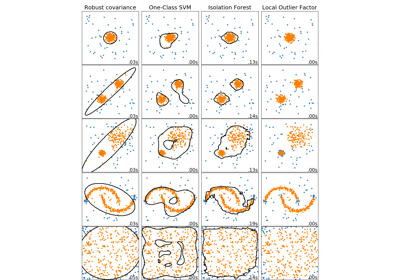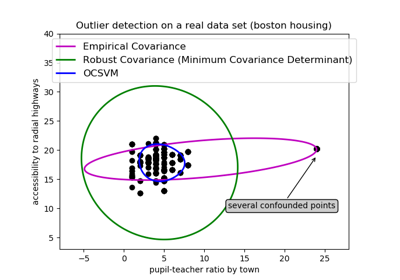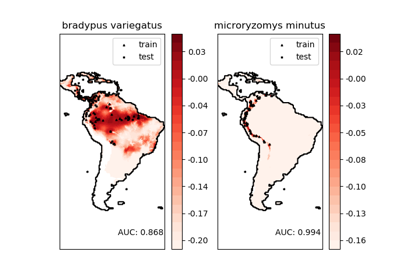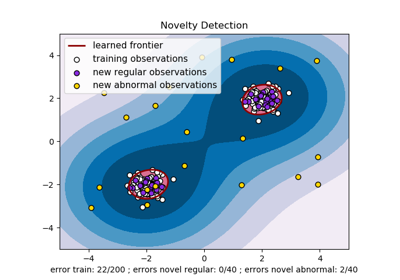sklearn.svm.OneClassSVM¶
-
class
sklearn.svm.OneClassSVM(kernel='rbf', degree=3, gamma='scale', coef0=0.0, tol=0.001, nu=0.5, shrinking=True, cache_size=200, verbose=False, max_iter=-1)[source]¶ Unsupervised Outlier Detection.
Estimate the support of a high-dimensional distribution.
The implementation is based on libsvm.
Read more in the User Guide.
- Parameters
- kernelstring, optional (default=’rbf’)
Specifies the kernel type to be used in the algorithm. It must be one of ‘linear’, ‘poly’, ‘rbf’, ‘sigmoid’, ‘precomputed’ or a callable. If none is given, ‘rbf’ will be used. If a callable is given it is used to precompute the kernel matrix.
- degreeint, optional (default=3)
Degree of the polynomial kernel function (‘poly’). Ignored by all other kernels.
- gamma{‘scale’, ‘auto’} or float, optional (default=’scale’)
Kernel coefficient for ‘rbf’, ‘poly’ and ‘sigmoid’.
if
gamma='scale'(default) is passed then it uses 1 / (n_features * X.var()) as value of gamma,if ‘auto’, uses 1 / n_features.
Changed in version 0.22: The default value of
gammachanged from ‘auto’ to ‘scale’.- coef0float, optional (default=0.0)
Independent term in kernel function. It is only significant in ‘poly’ and ‘sigmoid’.
- tolfloat, optional
Tolerance for stopping criterion.
- nufloat, optional
An upper bound on the fraction of training errors and a lower bound of the fraction of support vectors. Should be in the interval (0, 1]. By default 0.5 will be taken.
- shrinkingboolean, optional
Whether to use the shrinking heuristic.
- cache_sizefloat, optional
Specify the size of the kernel cache (in MB).
- verbosebool, default: False
Enable verbose output. Note that this setting takes advantage of a per-process runtime setting in libsvm that, if enabled, may not work properly in a multithreaded context.
- max_iterint, optional (default=-1)
Hard limit on iterations within solver, or -1 for no limit.
- Attributes
- support_array-like of shape (n_SV)
Indices of support vectors.
- support_vectors_array-like of shape (n_SV, n_features)
Support vectors.
- dual_coef_array, shape = [1, n_SV]
Coefficients of the support vectors in the decision function.
- coef_array, shape = [1, n_features]
Weights assigned to the features (coefficients in the primal problem). This is only available in the case of a linear kernel.
coef_is readonly property derived fromdual_coef_andsupport_vectors_- intercept_array, shape = [1,]
Constant in the decision function.
- offset_float
Offset used to define the decision function from the raw scores. We have the relation: decision_function = score_samples -
offset_. The offset is the opposite ofintercept_and is provided for consistency with other outlier detection algorithms.- fit_status_int
0 if correctly fitted, 1 otherwise (will raise warning)
Examples
>>> from sklearn.svm import OneClassSVM >>> X = [[0], [0.44], [0.45], [0.46], [1]] >>> clf = OneClassSVM(gamma='auto').fit(X) >>> clf.predict(X) array([-1, 1, 1, 1, -1]) >>> clf.score_samples(X) # doctest: +ELLIPSIS array([1.7798..., 2.0547..., 2.0556..., 2.0561..., 1.7332...])
Methods
decision_function(self, X)Signed distance to the separating hyperplane.
fit(self, X[, y, sample_weight])Detects the soft boundary of the set of samples X.
fit_predict(self, X[, y])Perform fit on X and returns labels for X.
get_params(self[, deep])Get parameters for this estimator.
predict(self, X)Perform classification on samples in X.
score_samples(self, X)Raw scoring function of the samples.
set_params(self, \*\*params)Set the parameters of this estimator.
-
__init__(self, kernel='rbf', degree=3, gamma='scale', coef0=0.0, tol=0.001, nu=0.5, shrinking=True, cache_size=200, verbose=False, max_iter=-1)[source]¶ Initialize self. See help(type(self)) for accurate signature.
-
decision_function(self, X)[source]¶ Signed distance to the separating hyperplane.
Signed distance is positive for an inlier and negative for an outlier.
- Parameters
- Xarray-like, shape (n_samples, n_features)
- Returns
- decarray-like, shape (n_samples,)
Returns the decision function of the samples.
-
fit(self, X, y=None, sample_weight=None, **params)[source]¶ Detects the soft boundary of the set of samples X.
- Parameters
- X{array-like, sparse matrix}, shape (n_samples, n_features)
Set of samples, where n_samples is the number of samples and n_features is the number of features.
- sample_weightarray-like, shape (n_samples,)
Per-sample weights. Rescale C per sample. Higher weights force the classifier to put more emphasis on these points.
- yIgnored
not used, present for API consistency by convention.
- Returns
- selfobject
Notes
If X is not a C-ordered contiguous array it is copied.
-
fit_predict(self, X, y=None)[source]¶ Perform fit on X and returns labels for X.
Returns -1 for outliers and 1 for inliers.
- Parameters
- Xndarray, shape (n_samples, n_features)
Input data.
- yIgnored
Not used, present for API consistency by convention.
- Returns
- yndarray, shape (n_samples,)
1 for inliers, -1 for outliers.
-
get_params(self, deep=True)[source]¶ Get parameters for this estimator.
- Parameters
- deepbool, default=True
If True, will return the parameters for this estimator and contained subobjects that are estimators.
- Returns
- paramsmapping of string to any
Parameter names mapped to their values.
-
predict(self, X)[source]¶ Perform classification on samples in X.
For a one-class model, +1 or -1 is returned.
- Parameters
- X{array-like, sparse matrix}, shape (n_samples, n_features)
For kernel=”precomputed”, the expected shape of X is [n_samples_test, n_samples_train]
- Returns
- y_predarray, shape (n_samples,)
Class labels for samples in X.
-
score_samples(self, X)[source]¶ Raw scoring function of the samples.
- Parameters
- Xarray-like, shape (n_samples, n_features)
- Returns
- score_samplesarray-like, shape (n_samples,)
Returns the (unshifted) scoring function of the samples.
-
set_params(self, **params)[source]¶ Set the parameters of this estimator.
The method works on simple estimators as well as on nested objects (such as pipelines). The latter have parameters of the form
<component>__<parameter>so that it’s possible to update each component of a nested object.- Parameters
- **paramsdict
Estimator parameters.
- Returns
- selfobject
Estimator instance.





